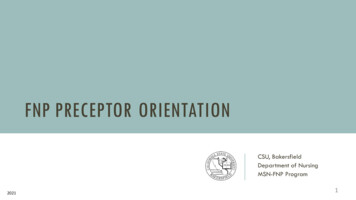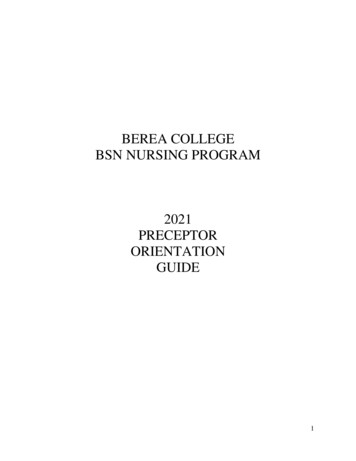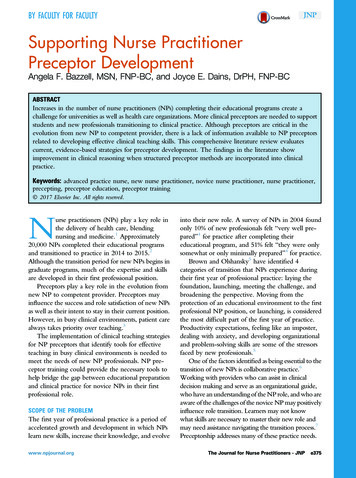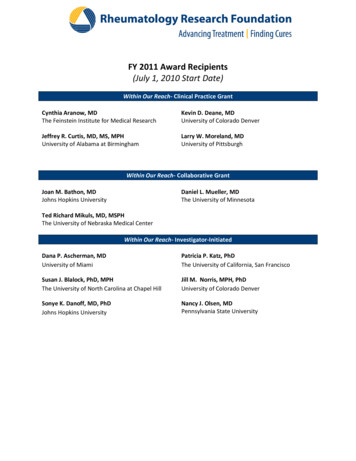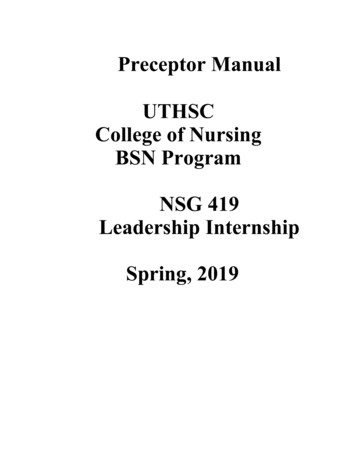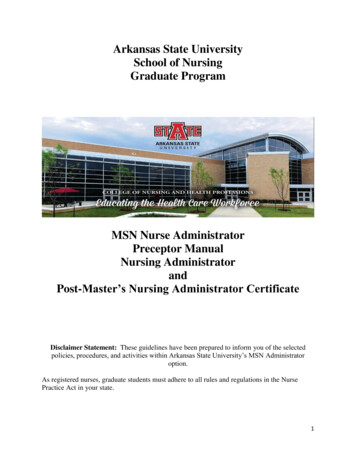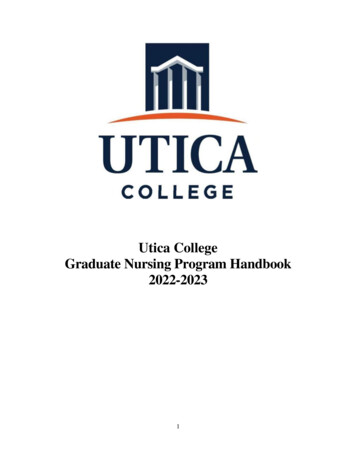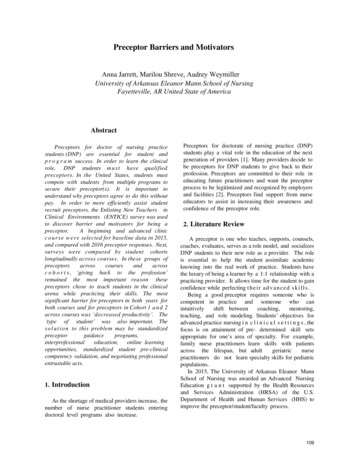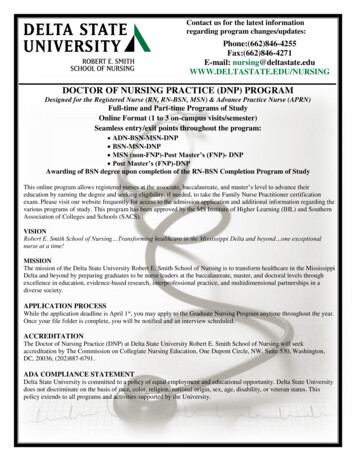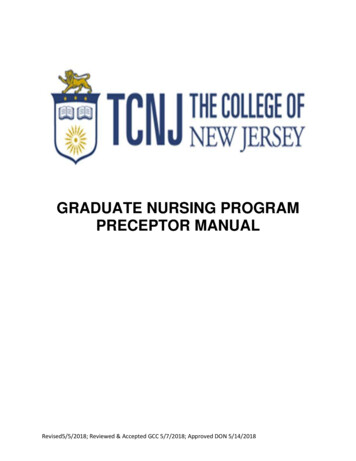
Transcription
GRADUATE NURSING PROGRAMPRECEPTOR MANUALRevised5/5/2018; Reviewed & Accepted GCC 5/7/2018; Approved DON 5/14/2018
TABLE OF CONTENTSWELCOME LETTER . 3GRADUATE PROGRAM FACULTY AND STAFF CONTACT INFORMATION. 4OVERVIEW OF PROGRAMS . 5THE COLLEGE OF NEW JERSEY MISSION STATEMENT . 6DEPARTMENT OF NURSING MISSION STATEMENT . 6GUIDELINES CONCERNING BEHAVIOR IN CLINICAL SETTINGS . 6ACADEMIC INTEGRITY . 7THE ROLE OF THE PRECEPTOR . 7IN THE EDUCATION OF GRADUATE NURSING STUDENTS . 7MSN End of Program Objectives/Expected Outcomes . 8CHARACTERISTICS OF EFFECTIVE CLINICAL TEACHERS* . 9STRATEGIES FOR ENHANCING CRITICAL THINKING .11INSTRUCTIONS FOR PRECEPTORS IN EVALUATING STUDENTS .12APPENDIX A: POST BSN/GRADUATE NURSING FACULTY PROFILE .13APPENDIX B: TCNJ SCHOOL NURSE PRECEPTOR WELCOME LETTER .14APPENDIX C: STANDARDS FOR STUDENT CLINICAL PRACTICE .24APPENDIX D: GENERAL TYPHON INSTRUCTIONS FOR PRECEPTORS .27APPENDIX E: TCNJ DEPARTMENT OF NURSING SAMPLE CLINICAL PERFORMANCEEVALUATION OF STUDENTS .28APPENDIX F: REFERENCES AND SUGGESTED READINGS .30Reviewed & Accepted by GCC 5/7/2018; Approved DON 5/14/20182
WELCOME LETTERDear Clinical Preceptor:Welcome and thank you for supporting the advanced nursing practice programs at TheCollege of New Jersey. Rich clinical experiences are essential for students to gain skill andcompetency, apply knowledge in actual patient care situations, engage in interdisciplinary caredelivery, and transition to an advanced nursing role. The College of New Jersey Department ofNursing recognizes your significant contribution as partners in this effort and we hope that theexperience proves to be rewarding.In appreciation for your willingness to serve as a preceptor for the nurse practitionerand/or clinical nurse leader students at TCNJ we would like to make the following available toyou.1. TCNJ will provide a certificate of hours each semester.2. Title for your resume/CV of “Clinical Preceptor Faculty” at TCNJ for the time you areprecepting.3. Access to library privileges, the aquatic center and some discounts on campus activities.To access facilities and discounted fees, it is necessary for you to come to campus andobtain an ID card. If you desire to obtain a TCNJ ID card, please contact the nursing office at609-771-2591. Once you receive your authorization, you will also have to go to the StudentAccounts Department located in Green Hall 119, which is open Monday from 8:30am-5:00pmand Tuesday to Friday, 8:30am to 4:30pm.As part of our accreditation process, our Clinical Site Coordinator will be asking you tocomplete the form in Appendix A yearly. Thank you in advance for attention to this matter.Again, thank you for using your expertise to precept a TCNJ graduate student. We realizethe time commitment this entails and hope that you will be able to share in our campus life. If, atany time, you would like to talk with us about our graduate program or offer any suggestions forimproving the relationship between you and TCNJ, feel free to call either of us at the numberslisted below. Please note concerns about individual students should be addressed to the coursefaculty or to me.Thank you,Sharon K ByrneSharon Byrne, DrNP, APN, NP-C, AOCNP, CNEChair, Department of NursingAssociate Professor of Nursing609-771-3480/byrnes@tcnj.eduReviewed & Accepted by GCC 5/7/2018; Approved DON 5/14/20183
GRADUATE PROGRAM FACULTY AND STAFF CONTACT INFORMATIONProgram AddressThe College of New JerseyDepartment of NursingPO Box 77182000 Pennington Rd.Ewing, New Jersey 08628Program Phone NumbersOffice 609- 771- 2591: Fax 609-637-5159NameSpecialtyEmailphoneSharon Byrne, DrNP, APN, NP-C,AOCNP, CNEFamily &Oncologybyrnes@tcnj.edu609-771-3480Pamela Ford, MSN APN ANP-BCAdultpford@tcnj.edu609-771-2591Deirdre Jackson, MSN, RN, APN,CNL, CPNCNLjacksond@tcnj.edu609 771-2352Connie Kartoz, PhD, RN, APN,FNP-BCFamilykartozc@tcnj.edu609-771-2509Carole Kenner, PhD, RN, FAAN,FNAP, ANEFCarol Kuser LoserDean/Professor, School ofNursing, Health and 2541Deborah King MSN, RNClinical SiteCoordinatorKingd@tcnj.edu609-771-2669Ivy Pearlstein, MSN, APNFamilyPearlsi1@tcnj.edu609-771-2591Tracy Perron, PhD, RN, CNE,School NursePerront@tcnj.edu609-771-2854Colleen Silk DNP, APN, FNP-BCFamilysilkc@tcnj.edu609-771-2591Dara Whalen PhD, MSPH, APN,FNP-BC, CNE, SANEFamilywhalen@tcnj.eduCSNReviewed & Accepted by GCC 5/7/2018; Approved DON 5/14/20184609-771-2873
OVERVIEW OF PROGRAMSMaster of Science in NursingThe Master of Science in Nursing prepares advanced practice nurses to care for individuals andfamilies. The curriculum builds on the nursing and scientific knowledge base of thebaccalaureate prepared nurse and focuses on advanced clinical decision-making and criticalthinking skills. Graduates are prepared to accurately and critically assess the health and illnessexperiences of individuals/across the lifespan and families, to develop health interventions, andto evaluate healthcare outcomes. Detailed descriptions of our programs can be found lletin/.Master of Science in Nursing (MSN) Nurse Practitioner ProgramThere are currently four options: Family Nurse Practitioner, Adult-Gerontology Primary CareNurse Practitioner, Neonatal Nurse Practitioner.Post-Master’s Nurse Practitioner Certificate ProgramsThere are two types of post-master’s nurse practitioner programs. The first is designed forregistered nurses, with a master’s degree in nursing to become family or adult/gerontologyprimary care nurse practitioners. Students may take up to 6 years of part time study tocomplete either option. The second is a post-MSN program designed for nurse practitionerswho have achieved certification in a specialty and who want to expand their scope of practice toinclude the entire family. Programs of study are available for Adult, Pediatrics, and Women’sHealth Nurse Practitioners. This program may be completed in 3-5 semesters of part timestudy.Clinical Nurse Leader ProgramThe CNL MSN track prepares nurses with a BSN to engage in a leadership role across the carecontinuum. CNL students are prepared to evaluate care microsystems and implement evidencebased care changes utilizing quality improvement strategies. Graduates are prepared to takethe CNL certification exam.School Nurse MSNThe MSN in school nursing prepares students to be leaders in the school nurse environment.Students take courses that satisfy the NJ state requirements for certification as a school nursewithin the degree. Students may complete the certification and then return to the MSN portion,or they may complete the certification and master’s core courses simultaneously. Specificdocuments related to the school nurse MSN or the post BSN school nurse certificates arelocated in Appendix B.PROGRAM COMPLETION OBJECTIVES1.Synthesize theoretical knowledge from nursing, organizational, social, and biologicalsciences and apply to advanced practice nursing in the areas of health promotion, illnessprevention and management, and maintenance of function across the health-illness continuumwith individuals and families.Reviewed & Accepted by GCC 5/7/2018; Approved DON 5/14/20185
2.Critique and analyze research knowledge and utilize scientific evidence as a basis foradvanced nursing practice.3.Analyze individual, societal, political, and health care system forces that affect the healthof individuals and families in the community, and the roles of advanced practice nurses inproviding quality, cost-effective, and ethical care.4.Utilize holistic health assessment, critical thinking, and clinical decision-making skills todevelop and monitor comprehensive, client-based, culturally competent, and holistic plans ofcare.5.Gain competency in transitioning to the advanced practice roles of health care provider,collaborator, consultant, advocate, teacher, and professional nursing leader.THE COLLEGE OF NEW JERSEY MISSION STATEMENTThe College of New Jersey, founded in 1855 as the New Jersey State Normal School, isprimarily an undergraduate and residential college with targeted graduate programs. TCNJ’sexceptional students, teacher-scholars, staff, alumni, and board members constitute a diversecommunity of learners, dedicated to free inquiry and open exchange, to excellence in teaching,creativity, scholarship, and citizenship, and to the transformative power of education in a highlycompetitive institution. The College prepares students to excel in their chosen fields and tocreate, preserve and transmit knowledge, arts, and wisdom. Proud of its public service mandateto educate leaders of New Jersey and the nation, the College will be a national exemplar in theeducation of those who seek to sustain and advance the communities in which they live.DEPARTMENT OF NURSING MISSION STATEMENTThe mission of the Department of Nursing is congruent with that of The College of New Jerseyin promoting excellence, valuing diversity and providing a service to society in a community oflearners. The Department of Nursing serves the people of New Jersey and the nation bypreparing professional nurses at the baccalaureate level and advanced practice nurses at themaster’s level, with all graduates prepared to be successful ethical and visionary leaders in amulticultural, highly technological, and increasingly global world.PhilosophyThe philosophy of the Department of Nursing at The College of New Jersey reflects the beliefsof the faculty, provides the foundation and a direction for its programs and thereby contributes toexcellence in professional nursing.We, the faculty, espouse a philosophy that is humanistic in nature and emphasizes theuniqueness, dignity, and worth of each person. The faculty believes that each person has adynamic, creative drive with the potential toward higher levels of self-actualization. Nursing isviewed as a human science of persons and health experiences that are mediated byprofessional, personal, scientific, aesthetic and ethical human-to-human care transactions.GUIDELINES CONCERNING BEHAVIOR IN CLINICAL SETTINGSClinical Site AttireStudents are considered representatives of The College of New Jersey Department of Nursingwhenever involved in off-campus study. They are required to wear hair neatly off the collar,minimal jewelry, minimal perfume, and short fingernails (without dark nail polish). A white labReviewed & Accepted by GCC 5/7/2018; Approved DON 5/14/20186
coat worn over street clothes is required unless otherwise stated by clinical agency or preceptor.Trousers should not be denim jeans or jean-type. Closed, low-heeled shoes are required. Tshirts are not appropriate. An ID badge with the student’s name and which identifies them as aStudent Nurse Practitioner or Graduate Nursing Student is required.Definitions of Safe, Satisfactory or Acceptable Performance: The student will demonstratepatterns of professional behavior which follow the legal and ethical codes of nursing; promotethe actual or potential wellbeing of clients, health care worker, and self; demonstrateaccountability in preparation, documentation, and continuity of care; and show respect for thehuman rights of individuals. Students, who are not meeting the academic requirements of thetheoretical component of the course at any time during the semester, may not be consideredsafe and may, at the discretion of the instructor, automatically be excluded from clinicalexperience.More detailed information related to standards for student clinical performance is in Appendix C(Standards for Student Clinical Practice).ACADEMIC INTEGRITYAll students enrolled in any of the graduate nursing programs must adhere to academic integritypolicies of The College of New Jersey. Upon enrollment in The College of New Jersey, allstudents are required to read the academic integrity statements, and sign that they understandthe policies. Academic integrity applies to the clinical setting as well. The TCNJ policy can befound at: http://policies.tcnj.edu/policies/digest.php?docId 9394. If you have any concernsabout a students performance, please contact the course faculty (signer of your clinicalagreement letter).THE ROLE OF THE PRECEPTORIN THE EDUCATION OF GRADUATE NURSING STUDENTSTeaching, guiding, and mentoring nurses as they develop the knowledge and skills to becomeadvanced practice nurse colleagues takes knowledge, skill, patience and dedication. As anexperienced nursing or medical professional, you already possess these attributes. By agreeingto serve as a preceptor, you have indicated that you are willing to share your skills, time,practice site, and patients with an eager learner.The following pages are provided to help you in your role as clinical preceptor for our students.They include information on how to provide a supportive environment for student clinicallearning and some tips on how to challenge your student to develop more advanced criticalthinking skills.Student OutcomesThe overall MSN Program Completion Objectives are below. In addition to the overall programobjectives, there are learning objectives for each course. You will receive a copy of the courseobjectives prior to your student’s first clinical day. Overall, during their clinical practicumexperiences, we expect students to focus on obtaining advanced patient assessment andmanagement skills. Students in our graduate programs are expected to evaluate and utilize thebest, current, clinical evidence as a basis for their clinical decision-making. Therefore, studentsmust learn to articulate the scientific basis for clinical decisions. Please do not hesitate to askstudents to verbalize the “WHY” of what they are doing!Reviewed & Accepted by GCC 5/7/2018; Approved DON 5/14/20187
MSN End of Program Objectives/Expected Outcomes1. Synthesize theoretical knowledge from nursing, organizational, social, and biologicalsciences and apply to advanced nursing practice in the areas of health promotion, illnessprevention and management, and maintenance of function across the health-illnesscontinuum with individuals and families.2. Critique and analyze research knowledge and utilize scientific evidence as a basis foradvanced nursing practice.3. Analyze individual, societal, political, and health care system forces that affect the health ofindividuals and families in the community, and advanced nursing practice roles in providingquality, cost-effective, and ethical care.4. Utilize holistic health assessment, critical thinking, and clinical decision-making skills todevelop and monitor comprehensive, client-based, culturally competent, and holistic plans ofcare.5. Gain competency in transitioning to the advanced practice roles of health care provider,collaborator, consultant, advocate, teacher, and professional nursing leader.Faculty Site VisitsThe faculty at The College of New Jersey, Department of Nursing believes strongly in providingsupport for our clinical preceptors and our students. Because clinical competence is soimportant to our role as nurses practicing in advanced role, we believe that multiple skilledevaluators should evaluate each student clinically. As part of our program of student supportand evaluation, each student is assigned to a clinical faculty advisor, as well as to a primarypreceptor, every semester. Clinical faculty advisors are expected to make a minimum of 2 visitsto each student at his or her clinical sites every semester. More visits are made if the studentneeds additional support or if the faculty member is unable to evaluate the student completelyduring initially scheduled visits, or if you, the preceptor request additional visits. These visits areprearranged with the student and clinical preceptor. During these visits the faculty member willfocus on evaluating the student’s clinical performance. Please try to set aside a few minutes todiscuss the student’s clinical performance with the faculty member during these visits.Alternatively, if your site is exceptionally busy on the day of the visit, you can arrange a followup phone consultation with the faculty member. If you have questions about the student’sperformance, or about our program, please do not hesitate to discuss these matters with thefaculty at any timeIn addition to evaluating the student’s interactions with patients, preceptors and other staff at theclinical site, clinical faculty advisors evaluate students’ documentation and provide writtenfeedback about the accuracy, comprehensiveness and organization of their notes. Students areasked to provide their clinical faculty advisor with copies of their documentation of patientencounters. If the clinical site utilizes checklists, or EMR charting for all patient careinteractions, the student is required to record selected encounters in SOAP format. This assiststhe faculty in evaluating student clinical decision-making as well as documentation. Out ofrespect for patient confidentiality and to comply with HIPPA privacy standards, students arerequired to remove all patient identifiers before removing any copies of chart notes from theclinical site. If you have questions or concerns about our patient privacy policies, please do nothesitate to contact the course faculty member.Clinical faculty members also provide feedback on clinical sites to the Lead Faculty, ProgramCoordinator, and course faculty. In order to do this, they may ask you some questions duringthe site visit about such things as the practice’s philosophy, patient case load and case mix.Reviewed & Accepted by GCC 5/7/2018; Approved DON 5/14/20188
Preceptor Evaluation of Student PerformanceFor most courses, you will be asked to evaluate your student twice during the semester: atmidterm and at the end of the semester using our electronic clinical tracking systemTyphon. You will receive email information regarding Typhon as well as log-in instructions. Youwill also receive timely email reminders of the due dates for all clinical evaluations. Please notethat all evaluations are completed electronically in the Typhon Group, LLC System and coursefaculty will have access to view and complete their student evaluations online (specificinstructions for use of the system will be sent separately to you preferred email address). If youdo not wish to complete this evaluation online, a paper copy can be provided by the student.This document can also be found in Appendix E.NOTE: Students in our Clinical Nurse Leader or School Nurse Certificate program have asimilar but slightly different evaluation tool and we will share that tool with you.Please do not hesitate to call the clinical or course faculty, or the program coordinator, ifyou need assistance in evaluating your student.Students are also asked to evaluate their own clinical performance using a similar evaluationform as well as log all clinical hours and patient encounters in Typhon. Students will ask you toverify their hours either electronically, or via paper logs. It is beneficial to the student if youreview their hours and review their self-evaluation and your evaluation with them prior tosubmitting your evaluation online. This provides the basis for a helpful discussion of thestudent’s perception of their clinical abilities as compared to your own. Please do not hesitate tocontact course or clinical faculty members at any time during the semester if you have aconcern about student performance or student evaluation.CHARACTERISTICS OF EFFECTIVE CLINICAL TEACHERS*Effective Clinical Teachers/Mentors/Preceptors:1. Create an environment that is conducive to learning that requires: Knowledge of the practice area Clinical competence Knowledge of how to teach A desire to teach2.Are supportive of learners; such support requires: Knowledge of the learners Knowledge of the practice area Mutual respect3.Possess teaching skills that maximize student learning; this requires an ability: Diagnose student needs Learn about students as individuals, including their needs, personalities, andcapabilities4.Foster independence so that students learn how to learn5.Encourage exploration and questions without penalty6.Accept differences among studentsReviewed & Accepted by GCC 5/7/2018; Approved DON 5/14/20189
7.Relate how clinical experiences facilitate the development of clinical competence8.Possess effective communication and questioning skills9.Serve as a role model10.Enjoy nursing and teaching11.Are friendly, approachable, understanding, enthusiastic and confident about teaching12.Are knowledgeable about the subject matter and are able to convey that knowledge tostudents in their practice areas13.Exhibit fairness in evaluation14.Provide frequent feedback*Billings, D. & Halstead, J. (2015). Teaching in nursing: A guide for faculty 5th Edition.Philadelphia, Pa: W.B. Saunders Company.Reviewed & Accepted by GCC 5/7/2018; Approved DON 5/14/201810
STRATEGIES FOR ENHANCING CRITICAL THINKINGThe following are techniques you may want to suggest to your student as a way of helping themto learn how to think critically about clinical problems.Anticipate the questions others might ask Ask “Why” questions Ask “What else” questions Ask “What if” questions Paraphrase in your own words Compare and contrast Organize and reorganize information Look for flaws in your thinking Ask someone else to look for flaws in your thinking Develop “good habits of inquiry” Revisit information Replace the phrases “I don’t know” or “I’m not sure” with “I need to find out” Turn errors into learning opportunities Share your mistakes – they are valuable ADDITIONAL RESOURCESStudent Case Presentations SNAPPS: /teaching-nuts-bolts/snapps/#Adult-Gero APRN Preceptor ownload/NewsItems/PreceptorToolkit.pdf Reviewed & Accepted by GCC 5/7/2018; Approved DON 5/14/201811
INSTRUCTIONS FOR PRECEPTORS IN EVALUATING STUDENTS1.Read the grading key at the top of the “Clinical Performance Evaluation ofStudents” instrument carefully.2.Evaluate student based on your assessment of multiple (not a single) interactionsbetween the student and patients (and family members if applicable).3.It is preferable to evaluate the student based on your observation of his/her interactionswith more than one patient/family.4.Assessments should be based on student’s performance independent of coaching, inputor guidance from faculty members or preceptors. In other words, evaluate their level ofperformance without your guidance/assistance.5.Grades of “above average” should be reserved for those students whose performancetruly meets the criteria set forth in the grading key.6.If a student is performing in an “unsatisfactory” manner in one or more behaviors orobjectives, please contact the course faculty as soon as possible so we can offer assistance toyou and to the student. Likewise, if the student’s performance is in the “poor” range, faculty canassist you and the student to remediate performance deficiencies that the student may have.7.Please contact course faculty right away if you notice performance deficiencies. Do notwait until late in the semester to notify faculty of student performance problems.Reviewed & Accepted by GCC 5/7/2018; Approved DON 5/14/201812
APPENDIX A: POST BSN/GRADUATE NURSING FACULTY PROFILEAll Faculty Complete this FormAttach CV of lead faculty for the program/track CVs or resumés for other faculty available onrequest.Name:State License/Approval/Recognition # RN:Credentials:APRN:Certification (List certification body and exp. date)Copy of current national certification and state license/approval/recognition available on file:YesNoAcademic Program Completed: Graduation Date:Track/Major:Faculty Appointment:% of Time in School of Nursing:% of FTE in Grad track:Clinical Teaching Responsibilities: (Include past academic year and current responsibilities)Clinical Course# StudentsClinical Sites DatesDidactic Teaching Responsibilities: (Include past academic year and current responsibilities)Didactic Course# StudentsDatesList Other Faculty Responsibilities: (e.g. other teaching, committee work, thesis/dissertationsupervision, research, etc.)Practice Experience:(List last 5 years with current practice first)Are you practicing now?YesNoIf yes, describe the following: Setting, Patient Population and PracticeApproximate current # of hours per week/month:week/month:Approximate # hours last year perReviewed & Accepted by GCC 5/7/2018; Approved DON 5/14/201813
APPENDIX B: TCNJ SCHOOL NURSE PRECEPTOR WELCOME LETTERWelcome!We are pleased that you have agreed to be a clinical preceptor for one of our School Nursestudents. You are vital to the success of our program. Students need the “real life” experiencethat only a clinical practice with an expert clinician can offer. The clinical site providesopportunities where the student can acquire knowledge, advance skills, and observe themodeling of professional behaviors. Without your willingness to participate, it would beimpossible to replicate the experiences the student needs to be successful.The following material provides general information about the College of New Jersey as well asspecifics regarding the School Nurse Program. Preceptor Guidelines and the course syllabuswith expectations of students are attached.Additional materials included are forms used to evaluate the student's clinical experience. Therole and responsibilities of the faculty and preceptor regarding evaluation of the student isexplained. Site visits by faculty are outlined as well as the procedure for preceptors who have astudent who is having difficulty in the clinical setting.As you may be aware, the Board of Nursing has recently adopted new regulations requiringcontinuing education for all nurses in the state of New Jersey. In accordance with N.J.A.C.134:37-5.3 Continuing Education, a registered professional nurse may obtain continuingeducation hours for acting as a preceptor for at least 100 hours as part of an organizedpreceptorship program: 10 hours for the period during which the registered professional nurseacts as a preceptor.Please feel free to contact the faculty of the course if you have questions, concerns, orrecommendations. The College of Nursing values your services as a preceptor and welcomesyour recommendations for making the preceptor role more effective and satisfying. We hopethat you find the materials contained here helpful in your role as a preceptor.Preceptor GuidelinesPreceptor QualificationsThe undergraduate preceptor is a currently licensed RN in New Jersey and is employed as anRN in the school district in which the preceptor experience is to occur. Minimum educationalpreparation is baccalaureate degree. The preceptor is expected to have a minimum of two yearsof clinical experience and has demonstrated competencies related to the area of assignedclinical teaching responsibilities.Roles and ResponsibilitiesThe preceptor will be assigned to no more than one student for any preceptor experience.Faculty must be available in person or by telecommunication for consultation with the preceptorand/or the student. The preceptor will have a written description of preceptor responsibilities forthe College of Nursing. Preceptors will function according to guidelines/criteria developed by thecourse faculty as long as they are consistent with the guidelines set forth in this policy. TheReviewed & Accepted by GCC 5/7/2018; Approved DON 5/14/201814
preceptor will be physically present in the agency and available to the student at all times duringthe prescribed clinical assignment.Preceptor EvaluationPreceptor evaluation will be completed by the students. The course faculty member will reviewall preceptor evaluations and determine satisfactory and unsatisfactory experiences, makedecisions regarding reappointment status, and provide appropriate feedback to preceptors.Faculty Responsibilities:Orient both the student and the preceptor to the clinical experience.Provide the preceptor an orientation to the philosophy, curriculum, course, and clinicalobjectives of the nursing program. Discuss student expectations, student guidelines for performance of procedures, andmethods of evaluation. Assume overall responsibility for teaching and evaluation of the student. Assure student compliance with standards on immunization, CPR, and current liabilityinsurance coverage. Work cooperatively with the preceptor and the agency to determine student learning needsand appropriate assignments. Meet with the clinical preceptor and the student in order to monitor and evaluate the learningexperience. Monitor student progress. Be readily available, e.g., telephone, pager or e-mail for consultation when students are inthe clinical area. Receive feedback from the preceptor regarding student performance. Preceptor Responsibilities:Function as a role model in
CSN School Nurse Perront@tcnj.edu 609 -771 2854 Colleen Silk DNP, APN, FNP-BC Family silkc@tcnj.edu 609-771-2591 . Master of Science in Nursing (MSN) Nurse Practitioner Program There are currently four options: Family Nurse Practitioner, Adult-Gerontology Primary Care Nurse Practitioner, Neonatal Nurse Practitioner. .
